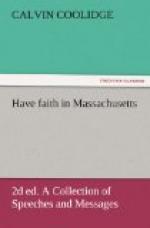It is not unusual to hear arguments against our institutions and our Government, addressed particularly to recent arrivals and the sons of recent arrivals to our shores. They sometimes take the form of a claim that our institutions were founded long ago; that changed conditions require that they now be changed. Especially is it claimed by those seeking such changes that these new arrivals and men of their race and ideas had no hand in the making of our country, and that it was formed by those who were hostile to them and therefore they owe it no support. Whatever may be the condition in relation to others, and whatever ignorance and bigotry may imagine, such arguments do not apply to those of the race and blood so prominent in this assemblage. To establish this it were but necessary to cite eleven of the fifty-five signers of the Declaration of Independence and recall that on the roll of Washington’s generals were Sullivan, Knox, Wayne, and the gallant son of Trinity College, Dublin, who fell at Quebec at the head of his troops,—Richard Montgomery. But scholarship has answered ignorance. The learned and patriotic research of men of the education of Dr. James J. Walsh and Michael J. O’Brien, the historian of the Irish American Society, has demonstrated that a generous portion of the rank and file of the men who fought in the Revolution and supported those who framed our institutions was not alien to those who are represented here. It is no wonder that from among such that which is American has drawn some of its most steadfast defenders.
In these days of violent agitation scholarly men should reflect that the progress of the past has been accomplished not by the total overthrow of institutions so much as by discarding that which was bad and preserving that which was good; not by revolution but by evolution has man worked out his destiny. We shall miss the central feature of all progress unless we hold to that process now. It is not a question of whether our institutions are perfect. The most beneficent of our institutions had their beginnings in forms which would be particularly odious to us now. Civilization began with war and slavery; government began in absolute despotism; and religion itself grew out of superstition which was oftentimes marked with human sacrifices. So out of our present imperfections we shall develop that which is more perfect. But the candid mind of the scholar will admit and seek to remedy all wrongs with the same zeal with which it defends all rights.




